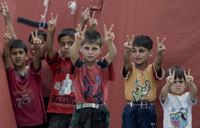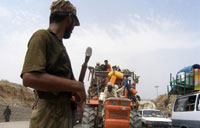 |
| World Refugee Day: They could smile harder and more? |
 |
| Pakistani civilians flee from N Waziristan? |
Syrians fleeing the bloodletting at home and a fast-growing web of other crises across the world accounted for the spike in the displaced, the UNHCR said in its annual Global Trends Report.
At the end of last year, 51.2 million people had been forced from their homes worldwide, the highest figure of displacement since World War II, said the UNHCR.
That's six million more people than at the end of the previous year, reflecting what the agency described as important undercurrents in international relations.
"Now we have a multiplication of new crises," UN High Commissioner Antonio Guterres said. "Today we not only have an absence of a global governance system, but we have sort of an unclear sense of power in the world."
The daunting numbers _ which are straining the resources of host countries and aid organizations alike _ also are a stark reflection of the ongoing conflicts and persecutions from Syria to the Central African Republic and South Sudan.
The over-50-million number includes refugees and asylum-seekers who fled abroad as well as people displaced within their own countries. The data was compiled from government, non-government partner organizations and UNHCR's own records.
Syria's civil war alone has forced 9 million people to flee their homes, with nearly 3 million escaping abroad while more than 6.5 million have been displaced within Syria.
Last year, there were 16.7 million refugees worldwide; including 11.7 million cared for by UN agencies. More than half of the refugees under UNHCR's care _ 6.3 million _ had been in exile for more than five years.
By country, the biggest populations of refugees were Afghans, Syrians and Somalis, the report said.
The countries hosting the largest number of refugees were Pakistan, Iran and Lebanon, whose stability is threatened by the raging Syrian war now in its fourth year.
